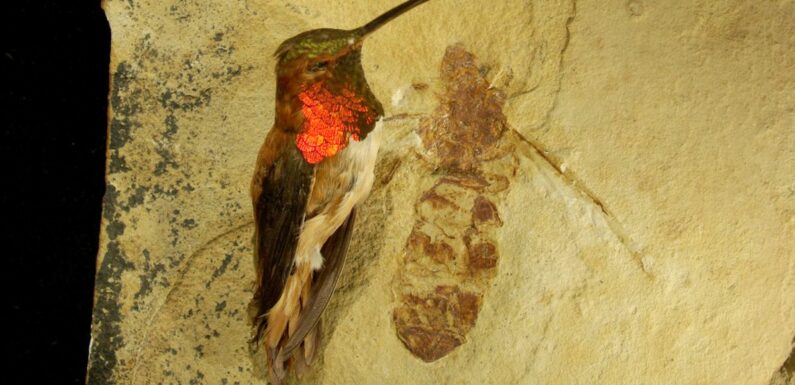
Scientists have found a fossilised ant the size of a hummingbird in a mind-blowing new discovery.
New remains of the enormous bug, called Titanomyrma, was discovered by a resident of Princeton in British Columbia, Canada, and passed on to researchers at Simon Fraser University (SFU) in Vancouver.
The ant, which roamed the Earth about 50 million years ago, had a wingspan of up to six inches and is believed to have either been carnivorous or have eaten foliage, much like smaller, modern ants.
READ MORE: Scientists revive ‘zombie’ virus that spent 48,500 years frozen in Siberian permafrost
Scientists also think it sprayed formic acid to defend itself.
Titanomyrma was first discovered in Wyoming, US, in 2011 and have previously been found Germany and the UK, and it was previously thought that the insects travelled from North America to Europe by land when the two continents were connected millions of years ago.
However the new discovery, the first of its kind in Canada, has changed what researchers believe about the bug's travel habits.
Met Office weather maps reveal exactly when UK-wide snow storm is set to end
“This ant and the new fossil from British Columbia are close in age to other Titanomyrma fossils that have been long known in Germany and England,” Bruce Archibald from SFU explained.
“This raises the questions of how these ancient insects traveled between continents to appear on both sides of the Atlantic at nearly the same time.”
The land connecting Europe and North America at the time stretched across the Arctic, but scientists had long believed the climate found there would be inhospitable for these enormous ants.
Researchers have found that Wyoming and Europe, where the ants were initially found, were much warmer when Titanomyrma roamed the planet than they are today.
Modern ant species with large queens also tend to be found in hot climates.
"If it was a smaller species, was it adapted to this region of cooler climate by reduction in size and gigantic species were excluded as we predicted back in 2011?" Archibald continued.
"Or were they huge, and our idea of the climatic tolerance of gigantic ants, and so how they crossed the Arctic, was wrong?
"Do our ideas of Titanomyrma's ecology, and so of this ancient dispersal of life, need revision? For now, it remains a mystery."
READ NEXT:
Woman who lost her fingers in botched 'mummy makeover' issues horrifying warning
Princess Diana planned big US move 'for ex and to give William and Harry perspective'
Tragic student ‘killed in university frat hazing ritual and dumped in open field’
Russian hackers post naked pics of cancer patients receiving treatment in ransom row
Source: Read Full Article



